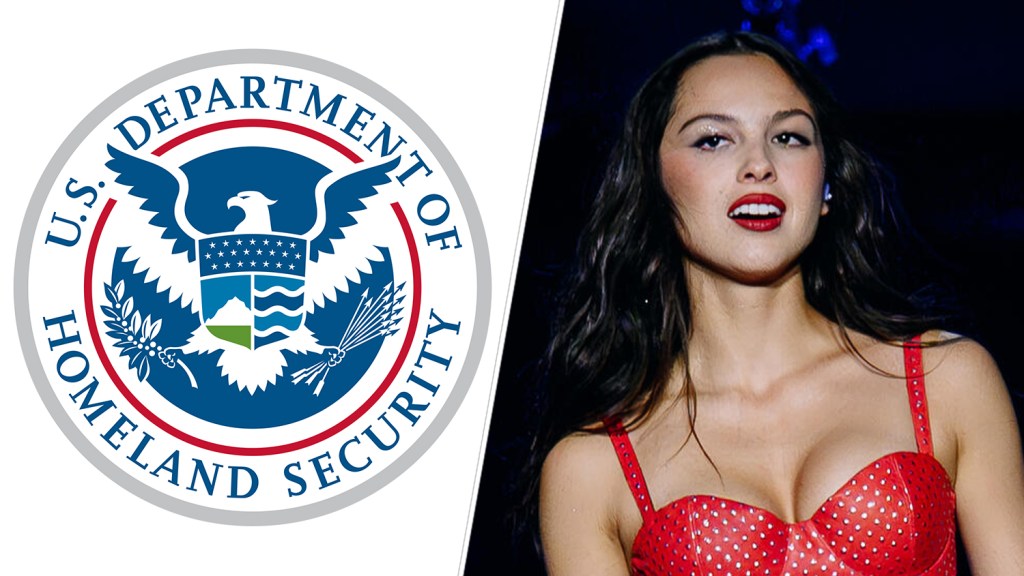Listen to the article
Pop Star Olivia Rodrigo Clashes with Homeland Security Over Use of Her Song
Grammy-winning artist Olivia Rodrigo has found herself in an unexpected confrontation with the U.S. Department of Homeland Security (DHS) after the federal agency used her 2023 track “All-American Bitch” in a controversial immigration enforcement video.
Rodrigo publicly condemned DHS for featuring her song in an Immigration and Customs Enforcement (ICE) social media post that urged undocumented immigrants to “LEAVE NOW and self-deport using the CBP Home app. If you don’t, you will face the consequences.” The singer left a comment on the post calling out officials for using her music to promote what she described as “racist, hateful propaganda.”
The Department of Homeland Security fired back with a response that pointedly referenced Rodrigo’s own lyrics. “America is grateful all the time for our federal law enforcement officers who keep us safe,” a DHS spokesperson told TMZ. “We suggest Ms. Rodrigo thank them for their service, not belittle their sacrifice.”
The video has since been modified and no longer contains Rodrigo’s song from her sophomore album “Guts.” Her original comment appears to have been deleted from the post as well.
This clash highlights the increasing tensions surrounding immigration enforcement under President Trump’s second administration. Since returning to office, Trump has rapidly implemented stricter immigration policies, with DHS announcing in January that it was ending restrictions that previously prevented ICE agents from making arrests at sensitive locations such as houses of worship, schools, and hospitals.
Rodrigo isn’t the first musical artist to take issue with the unauthorized use of their work in government immigration messaging. British singer Jess Glynne, known for her hit “Hold My Hand” (which gained additional popularity through Jet2 Holiday commercials), recently criticized the White House for incorporating her music in another ICE promotional video without permission.
Comedian Theo Von has also publicly condemned DHS for using clips of his content out of context in similar messaging campaigns.
The dispute underscores broader questions about artistic control and the ethical use of creative content by government agencies. For musicians like Rodrigo, who has built a brand around authenticity and personal expression, the unauthorized use of her music in politically charged content presents both a legal and reputational concern.
Music industry experts note that unauthorized use of copyrighted material by government agencies falls into a complex legal area. While certain government uses may qualify for exemptions under copyright law, artists and their representatives increasingly challenge such usage when it conflicts with their personal values or potentially damages their brand.
Rodrigo, who rose to fame with her debut single “Drivers License” and has since become one of pop music’s most prominent voices, has previously used her platform to advocate for various social causes. Her public stance against DHS signals her willingness to engage with controversial political issues despite potential backlash.
The incident also reflects the growing intersection of pop culture and politics, where content from entertainment figures is increasingly leveraged – sometimes without authorization – to advance political messaging in the digital age.
Neither Rodrigo’s representatives nor DHS officials have provided additional comments on whether any legal action might follow regarding the unauthorized use of her music.
Fact Checker
Verify the accuracy of this article using The Disinformation Commission analysis and real-time sources.




5 Comments
The use of copyrighted material without permission is legally questionable. However, this touches on important issues of immigration enforcement and free expression. I hope both parties can find a mutually acceptable solution.
This raises tricky questions about the intersection of art, politics, and government power. While I sympathize with Ms. Rodrigo’s stance, I’m curious to hear more about the DHS’s reasoning and perspective on this matter.
Invoking an artist’s own lyrics in a government response seems like an unnecessary escalation. Perhaps there could be a constructive dialogue to find a resolution that respects everyone’s rights and perspectives.
This is a complex and sensitive situation. While I understand Ms. Rodrigo’s concerns about the use of her music, it’s important to balance free speech with the government’s responsibility to enforce immigration laws. Both sides should approach this with nuance and good faith.
It’s concerning to see the government seemingly leveraging an artist’s own work against them. I hope this can be resolved through open dialogue and mutual understanding rather than escalation.